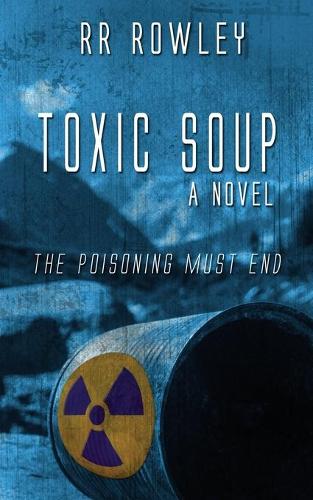RR Rowley is a multi-genre novelist currently living in Washington State. Having been writing since his adolescent years, Rowley’s works explore the humanitarian and environmental experiences that he is closest to. What We Reading sat down with Rowley to talk about some of these issues, as well as his acclaimed work, Toxic Soup!
Thanks for speaking with us, Rob! First off, tell us a bit about yourself and what led you to the world of writing.
Hi Everyone. I’m a writer who lives on the eastern slope of the Cascades Mountains in Washington State. I reside in the region of the setting for my novel, Toxic Soup. I come to this location after living and adventuring coast to coast in this country and for a long time in the West Indies and London, UK. My social scene in my rural location is limited, but I enjoy ecstatic dancing, yoga, drum circles, mushroom foraging, and organic gardening.
Drawn to writing as a teenager, I felt it necessary to have experiences to have something to write about. Experiences have been plentiful and kept me fully engaged until about twelve years ago when I finally circled back and surrendered to the calling to write. I write almost every day now.
“I felt it necessary to have experiences to have something to write about.”
Talk to us about Toxic Soup. What is it about, and how does it differ from your other works?
Toxic Soup is different from my other novels in that the protagonist is a female. Casey Long is an avid windsurfer and kayaker with a quirky and sometimes edgy personality, who, when confronted by the horrible death of her brother from exposure to nuclear waste at the Hanford Nuclear Reservation on the Columbia River, succumbs to and becomes consumed with revenge not only for her brother but for all of nature who has suffered from the leaking, contaminating waste storage of more than 70 years.
The task of confronting the powerful government facility is daunting. Together with a mishmash of friends, she devises a plan after exhausting all other possibilities. Driven by determination, the ghost of her brother, and a totemic she-wolf, exciting river adventures ensue in the capturing of ‘a taste of their own medicine‘ for her advisories.
In this novel, I explore the dark sides of humanity and how they can overcome an otherwise “normal” person. Compelled by frustrations, vengeance, and fervour Casey achieves her desired ends – but at what price?
What is the number one goal you want the book to have with readers?
Most important in this novel is showcasing the devastating continuing legacy of nuclear waste. Not only is there ongoing contamination but the threat of a cataclysmic event hangs ever ready to bring massive destruction. In this novel, I contrast the Columbia River Gorge’s striking beauty with the nuclear wasteland’s bareness.

What do you think makes you stand out as an author? Are you someone who throws themselves into the stories they write?
Most importantly, I write from the heart about humanity’s and the world’s issues. My novels are about things I care about but get told engagingly. I don’t seek to preach, only to illuminate through character’s struggles with the things many of us share. I admit to being a nature lover, and the prose in my novels reveals the wonder of the beauty of the Earth while hopefully opening channels for my readers to reflect upon this source of rejuvenation.
I most certainly ‘throw myself into my novels.’ Each is a stand-alone. I am not building a series or developing an ongoing protagonist. My novels are rich with unique, memorable characters that can make one laugh, cry, or share the depths of the human experience. Action, adventure, and romance also are vital elements of my stories.
“My novels are about things I care about but get told engagingly.”
If you could go back in time to one book you read for the first time, what would it be and why?
What comes to mind is “Islands In The Stream” by Ernest Hemingway. I have read it several times, enjoying the setting (important to me), the mix of family and personal conflict, and the adventure aspect. Perhaps my many years of Caribbean living connect me with this novel. The writing certainly does.
What do you think is the biggest obstacle facing independent and aspiring authors these days?
Without a doubt, marketing is the biggest challenge. Venues like this one I am comfortable with and feel engaged with a potential reader. Still, I’m not too fond of the badgering and sometimes intrusive nature of social media, promo letters, etc. I think you understand, although I don’t mind and appreciate interaction through my Facebook Author page and website.
“I’m not too fond of the badgering and sometimes intrusive nature of social media, promo letters, etc.”
If you could go back in time and give your younger self one tip, what would it be?
Perseverance Furthers.
And finally, what do you hope the future holds for you and your writing?
I hope and plan to continue writing novels that are entertaining and meaningful.
Follow Rob Roy at @rrrowley or find all of his works on his website and on Amazon
Part-time reader, part-time rambler, and full-time Horror enthusiast, James has been writing for What We Reading since 2022. His earliest reading memories involved Historical Fiction, Fantasy and Horror tales, which he has continued to take with him to this day. James’ favourite books include The Last (Hanna Jameson), The Troop (Nick Cutter) and Chasing The Boogeyman (Richard Chizmar).


